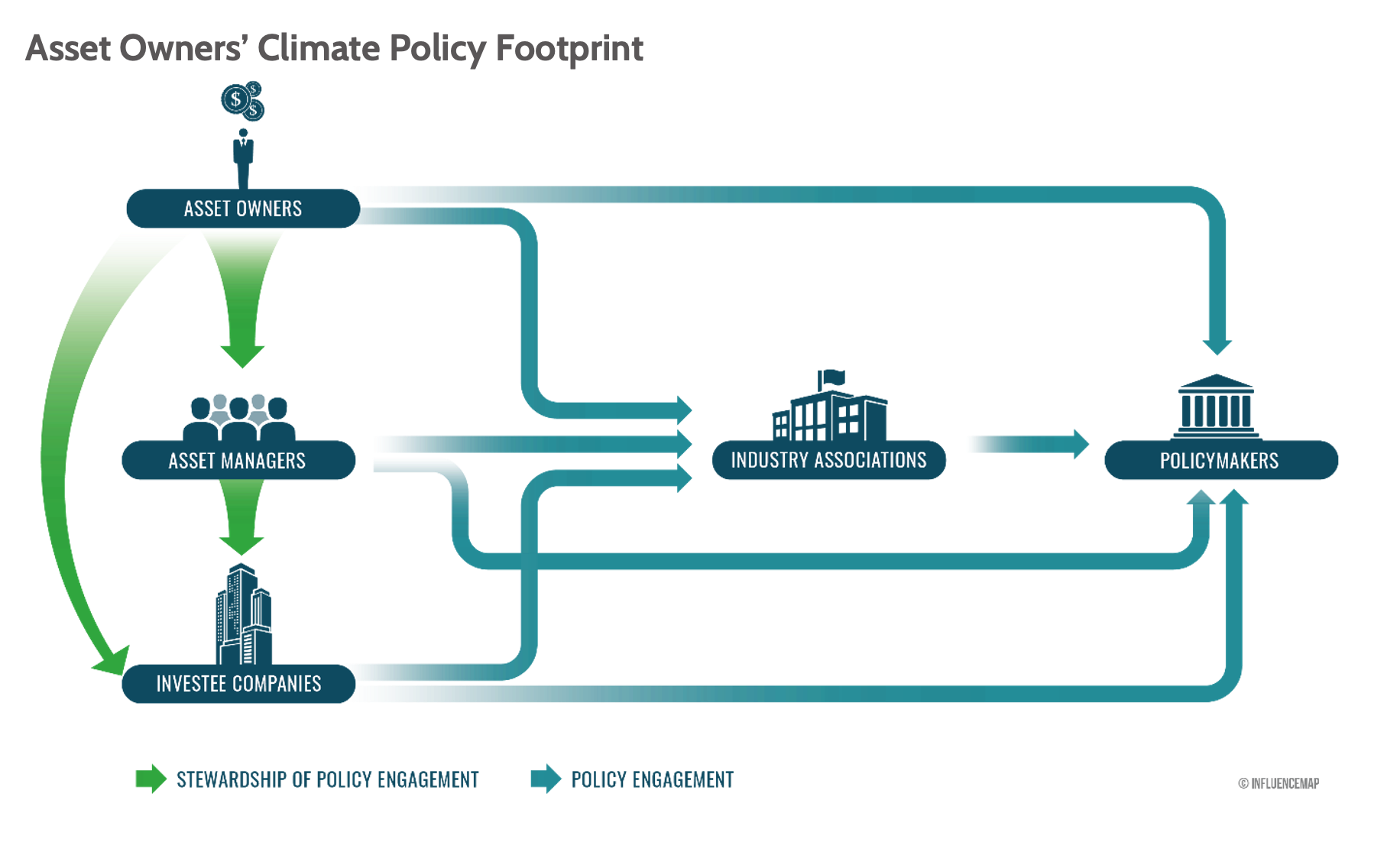New analysis of the world’s largest (1) insurers and pension funds (representing over $17 trillion in assets) finds that only a limited number are utilizing their influential position to drive climate policy advocacy in line with science-based pathways to net zero, and that the majority are abdicating responsibility in this area. This is despite 22 of the 30 assessed asset owners having set a net-zero commitment.
Asset owners’ long-term investment horizons and their influential position in the financial system make them potentially powerful advocates for government policy to achieve international climate goals. This is explicitly recognized by the Net- Zero Asset Owner Alliance (NZAOA), an industry initiative whose members commit to advocate for “public policies for a low- carbon transition of economic sectors in line with science.” The UN High Level Expert Group on Net Zero in their November 2024 report ‘Integrity Matters: The Hard Work is Now’ also stresses the importance all non-state actors should place on aligning lobbying and advocacy with 1.5°C in their net-zero transition plans.
The levers available to asset owners to affect policy change fall into two categories: their stewardship practices over investee companies’ lobbying and their own direct climate policy advocacy. The former includes direct stewardship of investee companies’ climate lobbying, and that done via external asset managers. The latter mechanism involves asset owners influencing climate policy themselves, either directly or via industry associations.
In this report, InfluenceMap provides the first holistic assessment of the world’s largest asset owners’ performance across both these areas.
The research finds there is an overall lack of stewardship on climate policy engagement among asset owners, with 73% scoring a D+ or below according to InfluenceMap’s analysis. Generally low scores are driven by low levels of transparency on stewardship activities.
The research finds that asset owners are not achieving their maximum direct policy advocacy potential and that there is room for increased climate advocacy across regions and types of asset owner.
Overall, a core group of asset owners has emerged that show leadership on one or more of the areas of influence available to them. These include Aegon, Phoenix Group, the New York City Retirement Systems (NYCRS), the California State Teacher’s Retirement System (CalSTRS), and the New York State Common Retirement Fund (NYSCRF). These leaders show that it is possible to influence climate policy through multiple avenues and provide best practice examples for other institutions.

Cleo Rank, Program Manager at InfluenceMap, said:
“Although it is encouraging to see a few asset owners actively stewarding companies and asset managers on climate lobbying, and engaging in robust direct policy advocacy, these companies represent only a fraction of the sector. By failing to engage, many asset owners are ceding their influence to more actively engaged industry associations that are often advocating against meaningful change. The commitments of groups like the Net-Zero Asset Owner Alliance are at risk of being undermined if their members do not fully buy in to its recommendations.”
Tracey Rembert, Associate Director of Climate and Environmental Justice at the Interfaith Center on Corporate Responsibility said:
“Quarterly meetings with investment managers are a ripe opportunity for asset owners to begin raising questions of how those managers are advocating for climate policies that can de-risk the portfolio and lead to more rapid decarbonization progress. At minimum, it shows that asset owners are paying attention to climate policy, and more importantly, it starts the critical conversation of what managers are doing to drive lower emissions across the investment universe—not just on a company-by company basis.”
A spokesperson for the Net-Zero Asset Owner Alliance said:
“For asset owners to effectively enact climate policy advocacy they must engage with their most important strategic partners – their asset managers. Meeting their net-zero commitments will become increasingly challenging without such engagement. In Aligning Climate Policy Engagement with Net-Zero Commitments, the Alliance outlines best practices for assessing asset managers’ climate policy engagement. The Alliance advises members and asset owners more widely to integrate this assessment into their selection, appointment, and monitoring processes of asset managers.”
1) Excluding institutions headquartered in China, due to challenges capturing corporate engagement in the country.
2) These are Phoenix Group, Aegon, Generali, the Government Pension Fund Global (GPFG) of Norway, the New York State Common Retirement Fund (NYSCRF), and the California Public Employees’ Retirement Systems (CalPERS).
3) All firms covered in this research were offered the opportunity to review the analysis and provide feedback prior to release.
For any questions about this report, please reach out to media {@} influencemap.org.